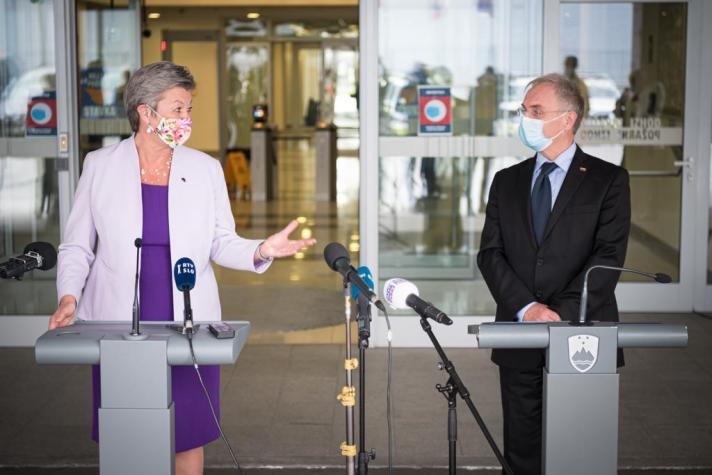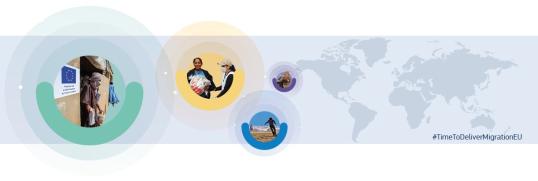Archived content
This website is no longer being updated. The content may be out-of-date and should be consulted for past reference only.
To find information about the College of Commissioners for the term 2024-2029, go to the Commission’s main website
This website is no longer being updated. The content may be out-of-date and should be consulted for past reference only.
This upcoming week, I will travel to Ljubljana, Slovenia for the first meeting of EU Home Affairs ministers under the Slovenian Presidency.
The next six months are an excellent opportunity to show not just the ‘why’, but the ‘how’ the EU can work better on migration management.
The Slovenian Presidency, and Minister Aleš Hojš, are very much up to the task. Minister Hojš and the Slovenian Government are aware of the challenges, as much as they are aware of the urgency.
And they do not have to face a start from a standing position. They have been given a significant boost by the Portuguese Presidency. What Minister Cabrita and his team achieved was to re-establish something that had been missing in the European migration debate for a number of years: momentum.
The long-awaited agreement on the Blue Card for skilled migrant workers shows that the European Union can make progress on migration, and is happy to welcome skilled people to help boosts our economies and enrich our societies.
The agreement by the European Parliament and the Member States a few weeks later to establish a European Union Agency for Asylum will greatly improve the processing of asylum applications by offering expertise and oversight. The compromise demonstrates that we can approach the Europeanisation of migration management not as a daunting ‘big bang’ but rather as a series of pragmatic, clear-headed measures.
The Slovenian Presidency understands this. Progress on #MigrationEU in the Council is a relay race, with each Presidency running its individual leg. Recent events show that the need to ‘Europeanise’ migration management is more urgent than ever. At the start of the year, it would have been difficult to predict that some of the voices calling for support on migration management and better relocation commitments would have been coming from Lithuania rather than southern EU. Yet because of the actions of the Lukashenko regime, that is where we are. My video message of support to Lithuania is a reminder that the EU is there when Member States face a common challenge.
In fact, this is exactly the kind of situation for which I developed and tabled the #MigrationEU proposals. What this shows us is that the call for support can come from the north, south, east or west. It also shows that we have to work together to invest in migration and asylum management and external border capacities everywhere in the EU, so that arrivals are dealt with in an orderly way and do not lead to a crisis. It is why we are working so closely with the European Parliament and the Slovenian Council Presidency to make step-by-step progress.
Part of that progress, as the Lithuanian situation shows, is improving the European integrated management of our external borders. My screening proposal puts forward a common European approach to checking people apprehended at the EU border, including security and health checks. And the Eurodac proposals aim to modernise the IT system that addresses unauthorised movements within the EU of people who asked for asylum. The technical work on aligning different States’ systems that log fingerprints has largely been done and now what’s needed is the political will to formalise the proposals.
Agreeing this part of the #MigrationEU proposals would improve our capacity to manage our shared external border.
While tightening our measures to manage irregular migration, we must also invest in ensuring that those who are in need of international protection have the chance to escape dangerous and life-threatening situations.
Last Friday (9 July) the Resettlement Forum I hosted with U.S., Canadian, EU and UN counterparts, illustrated that there has been a clear political shift. This event was an affirmation of the idea that resettlement illustrates the best of democracy and democratic leadership. You can watch the whole event here.
It illustrates that there is willingness to show, in the 70th year of the Geneva Convention on Refugees, that the obligation to provide international protection is an achievable commitment for liberal and responsible democracies.
I also hope to advance the negotiations on the Union Resettlement Framework Regulation, during the course of the Slovenian Presidency, to give us a stronger basis for our contribution to global resettlement efforts.
This agenda, this shared opportunity for progress, is eminently achievable. I am looking forward to our JHA informal meeting and to working with Minister Hojš to making the progress on migration that all Europeans want us to make.
#TimetoDeliverMigrationEU is a weekly blog outlining the benefits of the proposals on migration tabled by the European Commission on 23 September 2020. For more detail on the New Pact on Migration and Asylum see below.
For More information
New Pact on Migration and Asylum | European Commission (europa.eu)
Add link to the Resettlement Recommendation: EUR-Lex - 32020H1364 - EN - EUR-Lex (europa.eu)
Commissioner Johansson’s blog: A transparent and accountable EU-wide asylum and migration system means modern digital infrastructure
Commissioner Johansson’s blog: What a full European Asylum Agency would bring to asylum and migration management
Commissioner Johansson’s blog: More legal pathways to the EU
DG Migration and Home Affairs website: Resettlement and other pathways to protection
Statistics on migration to Europe
Details
- Publication date
- 11 July 2021
- Author
- Directorate-General for Communication


